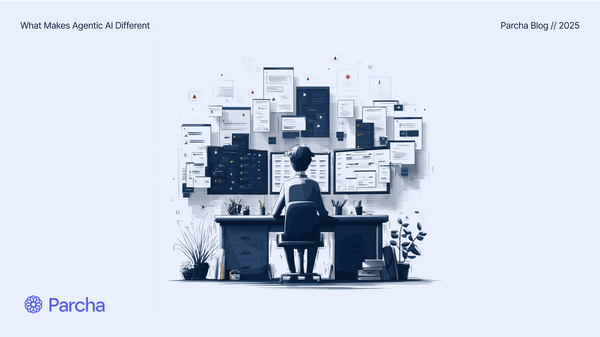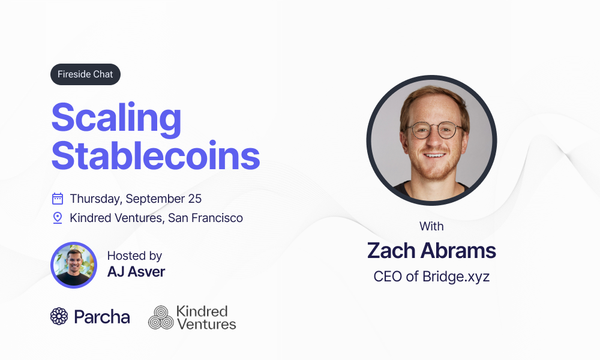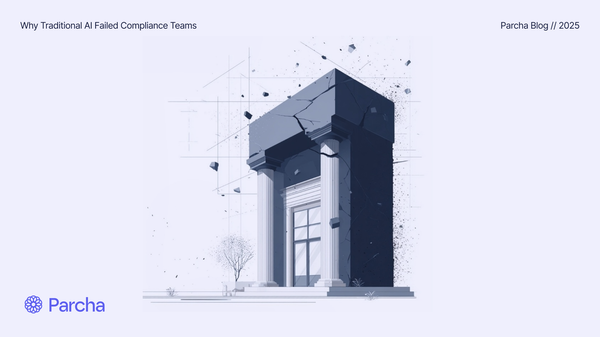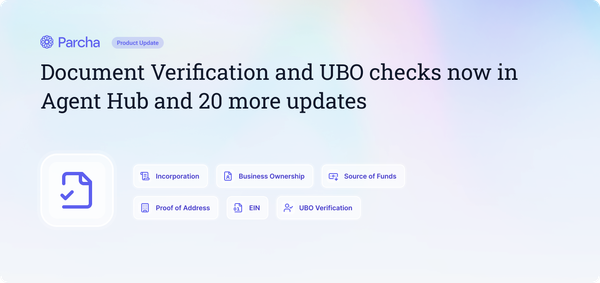Ep4 - How AI Agents Are Changing Financial Services
In this episode of Compliance Accelerated, hosts Alice and Bob dive into the transformative impact of AI agents in financial services.
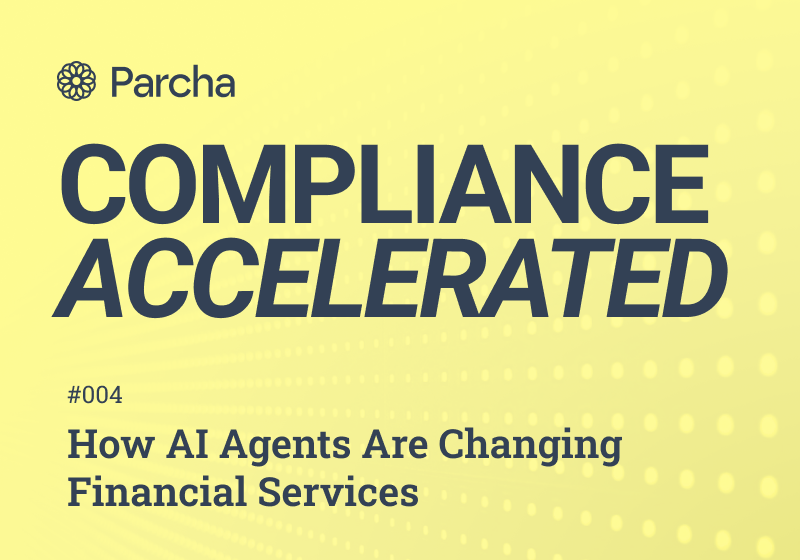
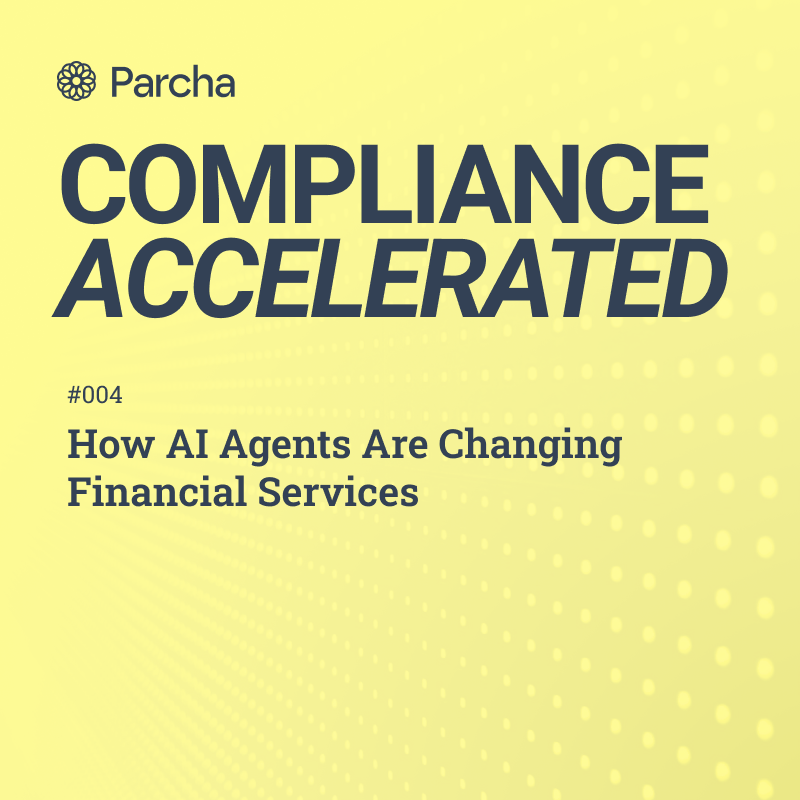
Compliance Accelerated is a podcast about the future of compliance and risk in banking and fintech. It is entirely generated by AI using Google's NotebookLM and edited by our team at Parcha.
You can now find all episodes of Compliance Accelerated on Spotify and Apple Podcasts.
In this episode of Compliance Accelerated, hosts Alice and Bob dive into the transformative impact of AI agents in financial services. Focusing on compliance and competitive strategies, they discuss Simon Taylor's framework for AI innovation, recently published in his newsletter Fintech Brain Food. In the post, he highlighted AI-driven workflow automation by companies like Stripe and the competitive edge AI provides fintechs over traditional banks. They address challenges incumbent banks face with legacy systems and explore partnerships with tech-savvy firms. The episode also examines the role of AI in augmenting human workers, underscoring the importance of transparency and responsible AI systems. Examples include South State Bank's AutoGPT-powered marketing campaign and Salesforce's Einstein AI, which showcase AI’s potential to transform compliance processes and ensure trust and accountability.
Sources
- The rise of AI Agents in Financial Services - Simon Taylor [link]
- October 2024 Fintech Newsletter: Fintech isn’t dead. AI is driving a new beginning - Andreessen Horowitz [link]
- The Risks of Generative AI Agents to Financial Services - Roosevelt Institute [link]
- The Next Wave Of AI In Banking: Intelligent, Autonomous Agents - Forbes [link]
- The Audit Log: Laying the Foundations for AI-accelerated Compliance [link]
Timestamps
00:00 Introduction to Compliance Accelerated
00:18 AI in Financial Services: An Overview
00:55 Simon Taylor's Framework for AI in Finance
01:47 AI as a Competitive Edge for Fintechs
03:25 Challenges for Traditional Banks
05:43 Incumbents Adapting to AI
07:04 Challenges of Legacy Systems
07:28 Integrating AI into Existing Workflows
08:22 Acquisitions and Partnerships
09:08 The Future of AI in Finance
10:19 Transparency and Trust in AI
11:41 Final Thoughts on AI in Finance
Transcript
[00:00:00]
AJ: welcome to compliance, accelerated a podcast by AI. At Parcha We helped bags and fintechs onboard more customers faster with stronger complaints using AI. Our AI is able to accelerate document verification. Enhanced due diligence processes. And AML screening.
In this episode of compliance, accelerated our hosts, Alice and Bob. Discuss how AI agents are changing the face of financial services. They talk about a few different use cases for AI agents, including compliance. And some of the important things to look out for when you're assessing an AI vendor. I hope you enjoy the episode.
Let us know if you have any feedback.
Bob: Welcome back to Compliance Accelerated. You know, we always like to dig into the future here and today, um, it's all about AI and compliance.
Alice: Yeah, AI and financial services, right?
Bob: Yeah. It's
Alice: everywhere you look these days.
Bob: It really is. Everyone's talking about it. And we want to do, you know, Really kind of cut through the noise a bit, so we've been digging into [00:01:00] Simon Taylor's latest thinking.
Alice: Oh, yeah
Bob: from fintech brain food.
Alice: Fintech brain food, always good stuff.
Bob: Really interesting insights as always and he's got this Um, you know this framework for how AI is being used by companies to win. Yeah in financial services, right? And he lays out I think it's four key strategies and we're gonna we're gonna dig into each one But you know with our lens on compliance, right?
Alice: Yeah. I mean, I think that's the key here, right? Yeah, because You know, you see all these like broad pronouncements about AI and, you know, it's going to change the world, which maybe it will, but what does it actually mean for, for compliance, for the work that, you know, our listeners are doing every day?
Bob: And
Alice: I think Simon does a really good job of kind of like breaking that down.
Bob: He does. Yeah. So his first point. Yeah. Right? Owning the workflow of growth companies. And he uses Stripe as an example here.
Alice: Yeah, Stripe's interesting, right? Because they're almost like, they're almost like the picks and shovels of the gold rush, right? Like, they're not necessarily the ones, you know, striking gold themselves, [00:02:00] but they're providing the infrastructure.
That all these other companies need.
Bob: Yeah, they're enabling it. Yeah.
Alice: Exactly. And they're using AI in really smart ways to, like, streamline their own operations. You know, things like fraud detection, risk scoring.
Bob: Right. And they've got to be on top of it. Right. Yeah. Because they're dealing with so much volume.
Alice: Exactly. I mean, you think about the scale that Stripe operates at. They need AI just to keep up.
Bob: Absolutely. So how does this, um, Yeah.
Alice: Yeah. Absolutely.
Bob: How does this translate to compliance then?
Alice: Well, I think you see a similar dynamic with companies like, say, Platter Unit, right? They're kind of like the stripe of compliance in a way.
They're integrating directly into these fintech workflows. And they're using AI to automate all sorts of tasks, you know, KYC, AML, all that good stuff.
Bob: So they're making it easier for these, like, these high growth fintechs to actually, like, get up and running.
Alice: Exactly. And to do it in a way that's compliant.
Bob: Right.
Alice: Which is not easy. Exactly. Right. Compliance is hard.
Bob: [00:03:00] It's not easy. It's time consuming. It's expensive. There are all these regulations.
Alice: Exactly. And that's where A. I. can really make a difference.
Bob: It's interesting, though, because, you know, we're talking a lot about these, like, newer companies, these fintechs, these disruptors, whatever you want to call them.
But what about the, um, The big banks, the incumbents,
Alice: right? The 800 pound gorillas in the room.
Bob: Exactly. Are they like, are they keeping up with all this?
Alice: Well, that's Simon's second point. Actually, AI agents as a wedge against incumbents.
Bob: Interesting,
Alice: right? Because here's the thing. A lot of these traditional banks, They're saddled with these legacy systems, outdated technology.
Bob: Bureaucracy.
Alice: Exactly. Yeah. It's really hard for them to move quickly, and these newer companies, they don't have that baggage.
Bob: Right. They can just build from the ground up.
Alice: Exactly. And they're using A. I. to, you know, To be more agile, to be more responsive. To be more efficient. Exactly. And that gives them a real competitive advantage.
Bob: So it's not just about, [00:04:00] like, automating tasks. It's about actually, like, changing the way you do business.
Alice: Absolutely. It's about transforming the entire organization.
Bob: So, give me an example then.
Alice: Well, you mentioned South State Bank earlier.
Bob: Right.
Alice: They used an AI agent, AutoGPT I think it was called, to manage a whole marketing campaign.
Bob: Yeah, and they pulled in, what was it, over two million dollars in new deposits?
Alice: Something like that. I mean, it was incredible. And the thing is, the AI wasn't just following some pre programmed script.
Bob: Right.
Alice: It was actually learning and adapting as it went along.
Bob: Really?
Alice: Yeah, like tweaking interest rates and stuff to optimize for their target outcomes.
Wow. So you can imagine how this same technology could be applied to compliance. Yeah,
Bob: what would that look like?
Alice: Well, imagine an AI agent that can. Analyze thousands of transactions per second, flag suspicious activity, even take proactive steps to mitigate risk.
Bob: It'd be like having a whole team of compliance analysts.
Alice: Working around the clock.
Bob: But without the coffee breaks.
Alice: Exactly. And [00:05:00] probably with a lot fewer errors too.
Bob: Yeah, I imagine so.
Alice: And that brings us to Simon's theory. Okay,
Bob: what is that?
Alice: So, they are trying
Bob: to catch up.
Alice: They are, they are. But the question is, are they doing it fast enough?
Bob: Right, because it's one thing to throw some AI at the problem.
But it's another thing to actually, like, integrate it into your existing workflows and processes.
Alice: Exactly. And that's where a lot of these incumbents are struggling.
Bob: Right. Because they've got all these legacy systems and processes.
Alice: Exactly. And it's not easy to change those things overnight.
Bob: It's like trying to turn a cruise ship around.
Pretty
Alice: much. It takes time and a lot of effort.
Bob: So what are they doing then?
Alice: Well, we are seeing some interesting developments.
Bob: Like what?
Alice: Like, Salesforce, for example. They've rolled out this Einstein Jibuti thing, which is supposed to be this, like, AI powered CRM platform. But the question is, is it really transformative?
Bob: Right. Or is it just like, [00:06:00] Putting lipstick on a pig as they say
Alice: exactly and that's the challenge for a lot of these incumbents They're trying to innovate but they're doing it within the constraints of their existing systems,
Bob: right? Which might be holding them back
Alice: exactly and that leads us to Simon's final point actually,
Bob: okay What's that
Alice: incumbents partnering with are acquiring AI startups?
Bob: So if you can't beat them Join them.
Alice: Pretty much. And we are seeing a lot of that happening.
Bob: Really?
Alice: Yeah. Like Fiddler Labs was just acquired for their AI capabilities and Galileo Financial Technologies. Same thing.
Bob: Interesting. So it's
Alice: clear the banks are
Bob: They're recognizing the need to bring in outside expertise.
Alice: Exactly. But as Simon points out, Speed is of the essence here.
Bob: Right, because if they wait too long
Alice: They risk falling too far behind.
Bob: Right, and then it might be too late to catch up.
Alice: Exactly.
Bob: It's a fascinating landscape, that's for sure. It
Alice: really is.
Bob: It's going to be interesting to see how it all plays out.
Alice: Absolutely, it is fascinating.
Bob: And, you know, it makes you think like Are these older institutions, are they really [00:07:00] going to be able to bridge that gap?
Alice: Yeah, it's a tough one. I mean, they've got the resources, right?
Bob: Mm hmm.
Alice: But they've also got all that baggage.
Bob: Yeah, the legacy system.
Alice: Yeah, and the bureaucracy.
And
Bob: maybe the culture, too, right? Oh,
Alice: absolutely. Like, if you're used to doing things a certain way, for decades. Yeah. It's really hard to suddenly, you know, just flip a switch and become This Agile AI first organization.
Bob: Right, it's a different mindset. Totally. So what's the answer then? Well,
Alice: so his third point is interesting.
Oh, okay. He talks about incumbent workflows.
Bob: Okay.
Alice: Adding AI agents.
Bob: So like, trying to integrate it into what they're already doing.
Alice: Exactly. And we are seeing some movement there.
Bob: Like what?
Alice: Well, you mentioned Salesforce earlier. Right,
Bob: they got that Einstein thing.
Alice: Yeah, Einstein GQT. Right. It's supposed to be this.
Bob: Right.
Alice: Like AI powered CRM platform. Okay. Okay. But. I'm not sure if it's really living up to the hype. Really? I mean, it's still early days. Right. But it feels a bit like they're just slapping AI on top of their existing [00:08:00] product without really rethinking the underlying workflows.
Bob: So it's not a game changer?
Alice: Not yet anyway.
Bob: Hmm. Interesting.
Alice: And that's the challenge for a lot of these incumbents. They're trying to innovate, but they're doing it within this very specific context of all these legacy systems and processes.
Bob: Which might be holding them back.
Alice: Exactly.
Bob: So what's the alternative?
Alice: Well, that brings us to Simon, the final point.
Bob: Okay.
Alice: Incumbents partnering with or acquiring.
Bob: So if you can't beat him, join him.
Alice: Pretty much. And we're seeing a lot of that happening.
Bob: Right. What?
Alice: Well, you had Fiddler Labs. Right. They were just acquired for their AI capabilities. And then there was Galileo Financial Technologies. So the point is, banks are clearly recognizing that they need to bring in outside expertise.
Bob: Yeah, if they want to stay ahead of the curve.
Alice: Exactly. But
Bob: isn't that always the way, though?
Alice: It kind of is. The big guys buy up the smaller guys. Hopefully they give them enough space to innovate.
Bob: Yeah, because otherwise it's just like, [00:09:00] you're buying the company, but then you're stifling the very thing. That made them valuable in the first place.
Alice: Exactly.
Bob: It's a delicate balance.
Alice: It really is.
Bob: But you know what's interesting to me is, Simon's not just talking about incremental improvements here. Right. He's painting this picture of a future. Where AI agents are like, the primary drivers of work and finance.
Alice: It's a bold vision.
Bob: It is. And
Alice: I think for some people, probably a little bit scary.
Oh, for
Bob: sure.
Alice: I mean, if AI can handle complex compliance reviews, what does that mean for the role of humans?
Bob: Right. That's the million dollar question. It
Alice: is. And I don't think there's an easy answer. I
Bob: mean, are we all going to be out of a job?
Alice: Right. I don't think so. At least not yet.
Bob: Okay. Good.
Alice: But seriously, I think it's more about AI.
Augmentation, not replacement.
Bob: Right. Using AI to help us.
Alice: Exactly. Like, imagine if you could take all those tedious, repetitive tasks.
Bob: Right. The stuff that nobody actually wants to do.
Alice: Exactly. And you could just hand them off to an AI.
Bob: So we could focus on [00:10:00] more interesting work.
Alice: Exactly. Like strategy or risk assessment.
Bob: Or, you know, actually talking to humans.
Alice: Right. Baiting relationships. Yeah,
Bob: that's important.
Alice: Absolutely.
Bob: So it's not about replacing humans.
Alice: No. It's about empowering them
Bob: to do their jobs better.
Alice: Exactly.
Bob: I like that.
Alice: And there's another piece to this too.
Bob: Okay. What's that?
Alice: Transparency.
Bob: Right. Because we can't just have these AI agents running around.
Making decisions.
Alice: In the shadows.
Bob: Yeah, in a black box.
Alice: Exactly. We need to be able to understand how they're making those decisions.
Bob: For so many reasons.
Alice: Absolutely. For compliance. For customer trust. Even for our own peace of mind.
Bob: So, how do we do that?
Alice: Well, that's where this idea of Glassbox AI comes in.
Bob: Okay, tell me more.
Alice: So, imagine you've got this AI agent, and it's reviewing transactions. Looking for suspicious activity. Right. But instead of just getting Yes or no answer.
Bob: Right. Flagged or not flagged.
Alice: Exactly. You can actually see every [00:11:00] step of the process. You can see the data it's looking at. The rules it's applying.
The logic behind its decisions.
Bob: So you can understand why it flagged something.
Alice: Precisely.
Bob: That's incredible. It's essential, not just for compliance.
Alice: Yeah.
Bob: But for building trust.
Alice: Trust with regulators. Yes. Trust with customers. Absolutely. They're just within our own organization.
Bob: Exactly.
Alice: And that's something we're really passionate about at Parcha.
I
Bob: was just going to say, that's what Parcha is all about.
Alice: Yeah, we're building AI. That's transparent, explainable, accountable.
Bob: Because we believe that's the only way to build truly trustworthy AI.
Alice: Right. AI that people can actually rely on.
Bob: Exactly.
Alice: Well said. So as we wrap up here, any final thoughts for our listeners?
Bob: Well, I think it's clear that AI is going to have a profound impact on the financial industry.
Alice: No doubt about it.
Bob: But it's up to us to make sure that impact is a positive one. Right.
Alice: By building AI. Responsible
Bob: and transparent.
Alice: Absolutely. Well said. This has been another [00:12:00] episode of Compliance Accelerated.
Thanks for joining us, and we'll see you next time.


